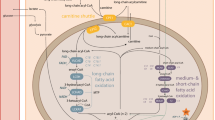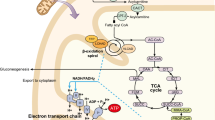Summary
Published data on treatment of fatty acid oxidation defects are scarce. Treatment recommendations have been developed on the basis of observations in 75 patients with long-chain fatty acid oxidation defects from 18 metabolic centres in Central Europe. Recommendations are based on expert practice and are suggested to be the basis for further multicentre prospective studies and the development of approved treatment guidelines. Considering that disease complications and prognosis differ between different disorders of long-chain fatty acid oxidation and also depend on the severity of the underlying enzyme deficiency, treatment recommendations have to be disease-specific and depend on individual disease severity. Disorders of the mitochondrial trifunctional protein are associated with the most severe clinical picture and require a strict fat-reduced and fat-modified (medium-chain triglyceride-supplemented) diet. Many patients still suffer acute life-threatening events or long-term neuropathic symptoms despite adequate treatment, and newborn screening has not significantly changed the prognosis for these severe phenotypes. Very long-chain acyl-CoA dehydrogenase deficiency recognized in neonatal screening, in contrast, frequently has a less severe disease course and dietary restrictions in many patients may be loosened. On the basis of the collected data, recommendations are given with regard to the fat and carbohydrate content of the diet, the maximal length of fasting periods and the use of l-carnitine in long-chain fatty acid oxidation defects.
Similar content being viewed by others
Abbreviations
- DHA:
-
docosahexanoic acid
- LCHAD(D):
-
long-chain 3-hydroxy-acyl-CoA dehydrogenase (deficiency)
- LCT:
-
long-chain triglycerides (long-chain fat)
- MCT:
-
medium-chain triglycerides
- MS/MS:
-
tandem mass spectrometry
- TFP(D):
-
mitochondrial trifunctional protein (deficiency)
- VLCAD(D):
-
very long-chain acyl-CoA dehydrogenase (deficiency)
References
Andresen BS, Olpin S, Poorthuis BJ, et al (1999) Clear correlation of genotype with disease phenotype in very long-chain acyl-CoA dehydrogenase deficiency. Am J Hum Genet 64:479–494. doi:10.1086/302261
German?Austrian/Swiss Nutrition Societies (2000) Die Referenzwerte für die Nährstoffzufuhr, 1st edn. Franfurt-am-Main: Umschau/Braus GmbH. ISBN 3-8295-7114-3
Gillingham MB, Weleber RG, Neuringer M (2005) Effect of optimal dietary therapy upon visual function in children with long-chain 3-hydroxyacyl CoA dehydrogenase and trifunctional protein deficiency. Mol Genet Metab 86:124–133. doi:10.1016/j.ymgme.2005.06.001
Gillingham MB, Scott B, Elliott D, Harding CO (2006) Metabolic control during exercise with and without medium-chain triglycerides (MCT) in children with long-chain 3-hydroxy acyl-CoA dehydrogenase (LCHAD) or trifunctional protein (TFP) deficiency. Mol Genet Metab 89:58–63. doi:10.1016/j.ymgme.2006.06.004
Gillingham MB, Purnell JQ, Jordan J, Stadler D, Haqq AM, Harding CO (2007) Effects of higher dietary protein intake on energy balance and metabolic control in children with long-chain 3-hydroxy acyl-CoA dehydrogenase (LCHAD) or trifunctional protein (TFP) deficiency. Mol Genet Metab 90:64–69. doi:10.1016/j.ymgme.2006.08.002
Gobin-Limballe S, Djouadi F, Aubey F (2007) Genetic basis for correction of very-long-chain acyl-coenzyme A dehydrogenase deficiency by bezafibrate in patient fibroblasts: toward a genotype-based therapy. Am J Hum Genet 81:1133–1143. doi:10.1086/522375
Gregersen N, Andresen BS, Corydon MJ, et al (2001) Mutation analysis in mitochondrial fatty acid oxidation defects: exemplified by acyl-CoA dehydrogenase deficiencies, with special focus on genotype-phenotype relationship. Hum Mutat 18:169–189. doi:10.1002/humu.1174
Gregersen N, Bross P, Andresen BS, et al (2004) Genetic defects in fatty acid beta-oxidation and acyl-CoA dehydrogenases. Molecular pathogenesis and genotype-phenotype relationships. Eur J Biochem 271:470–482. doi:10.1046/j.1432-1033.2003.03949.x
Liebig M, Gyenes M, Brauers G (2006) Carnitine supplementation induces long-chain acylcarnitine production - studies in the VLCAD-deficient mouse. J Inherit Metab Dis 29:343–344. doi:10.1007/s10545-006-0249-4
Ørngreen MC, Nørgaard MG, Sacchetti M, van Engelen BG, Vissing J (2004) Fuel utilization in patients with very long-chain acyl-coa dehydrogenase deficiency. Ann Neurol 56:279–283. doi:10.1002/ana.20168
Primassin S, Ter Veld F, Mayatepek E, Spiekerkoetter U (2008) Carnitine supplementation induces acylcarnitine production in tissues of very long-chain acyl-CoA dehydrogenase-deficient mice, without replenishing low free carnitine. Pediatr Res 63:632–637. doi:10.1203/PDR.0b013e31816ff6f0
Saudubray JM, Martin D, de Lonlay P, et al (1999) Recognition and management of fatty acid oxidation defects: a series of 107 patients. J Inherit Metab Dis 22:488–502. doi:10.1023/A:1005556207210
Solis JO, Singh RH (2002) Management of fatty acid oxidation disorders: a survey of current treatment strategies. J Am Diet Assoc 102:1800–1803. doi:10.1016/S0002-8223(02)90386-X
Spiekerkoetter U (2007) Effects of a fat load and exercise on asymptomatic VLCAD deficiency. J Inherit Metab Dis 30:405. doi:10.1007/s10545-007-0548-4
Spiekerkoetter U, Sun B, Zytkovicz T, Wanders R, Strauss AW, Wendel U (2003) MS/MS-based newborn and family screening detects asymptomatic patients with very long-chain acyl-CoA dehydrogenase deficiency. J Pediatr 143:335–342. doi:10.1067/S0022-3476(03)00292-0
Spiekerkoetter U, Bennett MJ, BenZe’ev B, Strauss AW, Tein I (2004) Peripheral neuropathy, episodic myoglobinuria and respiratory failure in deficiency of the mitochondrial trifunctional protein. Muscle Nerve 29:66–72. doi:10.1002/mus.10500
Spiekerkoetter U, Lindner M, Santer R, et al (2009) Management and outcome in 75 individuals with long-chain fatty acid oxidation defects: results from a workshop. J Inherit Metab Dis. doi:10.1007/s10545-009-1125-9
Wilcken B, Wiley V, Hammond J, et al (2003) Screening newborns for inborn errors of metabolism by tandem mass spectrometry. N Engl J Med 348:2304–2312. doi:10.1056/NEJMoa025225
Acknowledgements
This article presents results arising from a workshop on long-chain fatty acid oxidation disorders sponsored by Milupa Metabolics. The authors thank the other participants of the study group.
Author information
Authors and Affiliations
Corresponding author
Additional information
Communicating editor: Bridget Wilcken
Competing interests: None declared
Rights and permissions
About this article
Cite this article
Spiekerkoetter, U., Lindner, M., Santer, R. et al. Treatment recommendations in long-chain fatty acid oxidation defects: consensus from a workshop. J Inherit Metab Dis 32, 498–505 (2009). https://doi.org/10.1007/s10545-009-1126-8
Received:
Revised:
Accepted:
Published:
Issue Date:
DOI: https://doi.org/10.1007/s10545-009-1126-8




